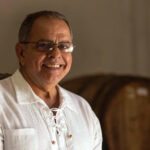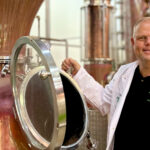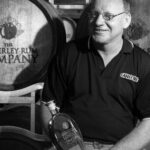Master Rum Distiller and creator of “Peligroso Pérez”: FRANCISCO PÉREZ DEL ROSARIO
TRL: Who is Francisco Pérez Del Rosario?
I am Francisco Pérez, Master Rum Distiller, and in other spirits. I was born in Las Palmas de Gran Canaria, and I grew up in a rum factory, playing in the cellar among sugarcane and fermentation tanks, where my father was the Technical Director, Master Distiller, and Master Rum Distiller. I studied engineering and had the opportunity to work in that distillery, where I spent 15 years following in my father’s footsteps.
My responsibilities included overseeing the estate, the distillery as a Master Distiller, a cellar with 6000 barrels, the laboratory, the production of rums and other spirits, and their bottling. Currently, I have created my own project, “Peligroso Pérez.”
I specialize in spirits, work as a consultant, train service teams, serve as a Brand Ambassador for some brands, and I am at the forefront of various culinary projects with chefs and food journalists. I dedicate myself to pairing menus with spirits and cocktails, giving tastings, and presenting products. The projects are endless; I work with the Bodega Vega de Yuco to release the first Distilled Volcanic Malvasia wine aged in French oak barrels. I am a Brand Ambassador for Ron Aldea, and work with Mezcals, Gins, Whiskies, Japanese Sake, Vermouth, and Vodka.
TRL: What does Rum mean to you? What made you fall in love with Rum and when did it happen?
Rum, for me, is home. I grew up in a rum factory, and from a young age, I unconsciously played in that environment, among sugarcane barrels. I could distinguish between a fermentation tank and a vinasse tank from a young age. I knew what Guarapo was, played among barrels being repaired. So, for me, “Rum is Home.”
TRL: Three essential characteristics that define rum from your perspective.
For me, rum is tradition and craftsmanship. Rum is that scent of olives and sugarcane that will transform into a barrel with the passage of time. Rum is patience.
TRADITION-CRAFTSMANSHIP-PATIENCE
TRL: What is the biggest contribution you have made to the rum industry?
Fifteen years of working in one of the largest distilleries in Europe is a contribution, but for me, the greatest contribution is what I am doing now. It’s being able to teach what rum is, to show the effort that goes into making it, and above all, to teach how to drink and taste it.
TRL: Benefits that the rum industry has provided you.
Obviously, we can talk about economic benefits, but when I started my project, I turned down offers from distilleries in the mainland and the Caribbean. The greatest benefit is having created my project from scratch, solely with my knowledge. Being able to share what I know is one of the best feelings I have. I meet very professional people in the gastronomy world; we are creators of culinary pleasures.
TRL: What else are you passionate about besides rum? Why?
I am passionate about spirits; I didn’t just make rum in that distillery. I am passionate about wine; I am passionate about Cask Strength or Single Cask spirits, and I like Mezcals, high-proof fruit spirits. I prefer strong and complex flavors and smells.
TRL: What is your favorite place to have rum?
More than places, of which I could choose many, I am more about the company. With the right company for each moment, you can taste, talk, and analyze a drink.
TRL: Favorite drink, recipe.
I prefer short, unblended drinks, but I also enjoy a good mixed drink. I have one that I call “Guateque.”
– On the rock long glass.
– Lots of ice.
– Orange twist.
– One measure (Jigger) of a good rum (Ron Aldea Maestro).
– Half measure of FeverTree Tonic.
– FeverTree Madagascar Cola.
TRL: Why is it important to educate the rum consumer?
The production of a distilled spirit is an art, from the preparation of its raw material in the fields, through fermentation, distillation, aging, to the final container. If the consumer has knowledge of the effort it took to produce that product, they will appreciate it and also know what they are paying for.
TRL: Any advice for training the palate to taste a good rum?
To train the palate, you have to drink and taste, and it is very important to taste everything, not just rum, but all kinds of spirits. In order to detect flavors and smells, it is important to recognize them beforehand, with the help of a Tasting Chart, which reflects the basic aromas and flavors in a tasting. This way, we can start recognizing those nuances.
TRL: How can rum contribute to improving the crisis in other countries?
Well, much like any other business, by creating jobs, ensuring the quality of the product to maintain prosperity, creating altruistic actions with society, and above all, having a demanding consciousness for sustainability and the environment.
TRL: Is a commitment to sustainable development the key to the rum industry’s success and longevity worldwide?
It is one of the keys since sustainability is everyone’s concern, and it applies to the rum industry as well. There will always be waste and pollution generated in the industry, and if we reduce it or practically make it disappear, we will be contributing. Fair trade is also a commitment, or ensuring that the company’s workers have dignified conditions and salaries.
TRL: Who would you like to meet in the rum industry? What would you say to them?
As a professional, I would like to meet many professionals like myself and visit their distilleries. I have already visited some, and what would I say? Well, simply conversing and exchanging impressions would be great. But I have no preferences; all rums and their distilleries seem fascinating to me.
TRL: What are your next goals in the rum industry?
On an industrial level, I like to collaborate on new projects, classify products in the cellar, and create new products. I am always innovating and trying to create. I don’t like monotony, and I believe that consumers deserve experiences that surprise them and take them out of the boredom that exists in society.
TRL: What are your plans when you leave the rum industry?
Well, a prosperous and peaceful retirement.
TRL: Why is the figure of the bartender important in the rum industry?
Professionals who know spirits, who are culinary creators, and know how to serve a good drink are needed by consumers, bar owners, spirit distributors, and the rum industry. This will generate wealth for everyone.
TRL: What is your advice for the new generations in the rum industry?
First, get to know the production process of the product you work with. Try to steer that production towards traditional and artisanal processes (as much as your company allows), and finally, get to know the rest of the products that exist in the world, in order to create new ones, to compare and improve.
TRL: How can people learn more about you? Social media page? “Peligroso Pérez”
Inicio
About The Author
Creative Director for EmpresasFH and Director of HOFFMANNdesign. Born and raised in Caracas, Venezuela, Mr. Hoffmann has been one of the most important designers for prestigious companies in South America, including Disney, Cartoon Network, Mattel among others.





